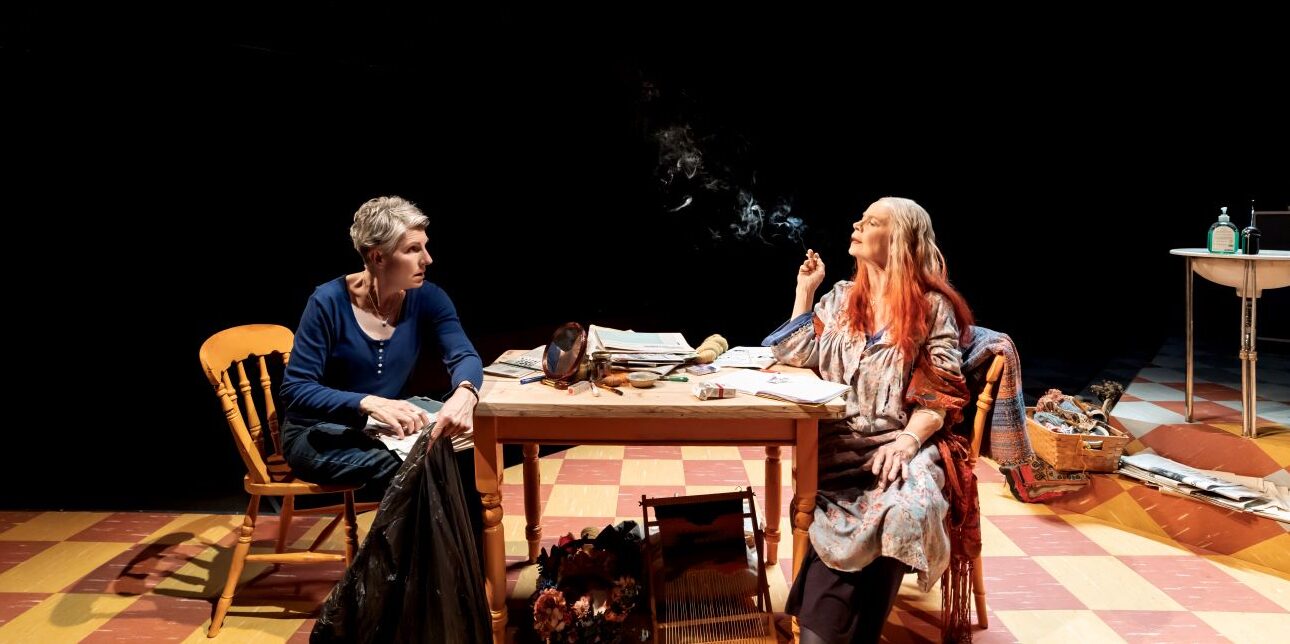How much of a mother is there in motherhood? It is a role scrutinized more than any other, burdened with countless expectations. When a woman resists this role, insisting, “I have a name,” as if motherhood alone could erase her, why does it unsettle us?
In Anna Mackmin’s semi-autobiographical play Backstroke at the Donmar Warehouse, we are taken on a journey through memory, love, resentment, and care—a current too strong to resist. The play confronts us with the difficult taboo of the “impossible” mother: Beth (Celia Imrie), a free spirit, an artist, a mother who inspired and wounded in equal measure, and, above all, a woman who refuses to be confined by the title of “Mommy.” Her daughter, Bo (Tamsin Greig), has spent a lifetime caught in this contradiction, parenting the woman who never wanted to be contained, learning that love, when tangled with duty, can feel like drowning.
The set, designed by Lez Brotherston, contrasts the warmth of the past with the starkness of the present. The mustard yellows and burnished oranges of Beth’s cluttered kitchen linger in the past, while the present is reduced to a cold hospital room, where Beth, once larger than life, is now tethered to machines in an antiseptic blue haze. Time is porous here—past and present bleed together, moments dissolve and resurface in fluid, fragmented memory.
Greig’s portrayal of Bo is tenderly anxious, her twitching hands revealing the rhythm of a lifetime spent bracing against the current. She carries responsibility like an anchor, its weight passed down through generations. The emotional burden manifests not only in Bo’s struggles but also in her adopted child’s PTSD, subtly captured in Gino Ricardo Green’s onstage videos.
Imrie’s Beth is mercurial and eccentric, her words rolling around her mouth like sweets, inhabiting the chaotic warmth of her childhood kitchen. Yet, the hospital room, where the constant beeping of machines serves as a cruel counterpoint to Beth’s inconsistency, is a space of reckoning. Here, the machine does what Beth could never do: it remains constant. It is both a comfort and a reminder of the inevitability of loss.
The pacing of the production mirrors the ebb and flow of the tide, with moments of reflection interrupted by sudden shifts in time and perspective. Mackmin resists offering catharsis, instead presenting the devastating truth that love, in all its forms, is not only about devotion but endurance.
Ultimately, Backstroke explores the complexities of co-dependence, where it becomes unclear who is caring for whom—Beth by Bo, Bo by Beth, or us, as witnesses to their love and suffering. The play leaves us with an uneasy, yet poignant, sentiment—comfort and discomfort intertwined in the exploration of love’s inherent contradictions.
Backstroke
Drama
Written and directed by Anna Mackmin
Cast includes: Tamsin Greig, Celia Imrie, Lucy Briers, Anita Reynolds, Georgina Rich
Until: 12 April
Running time: Approx. 2 hours and 25 minutes (with interval)
Photo Credit: Johan Persson

